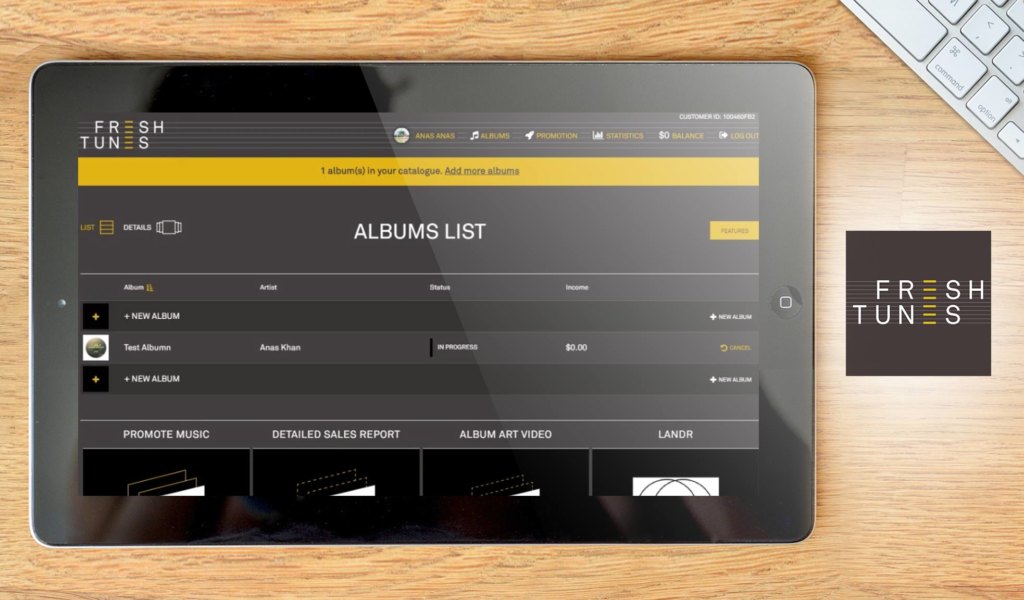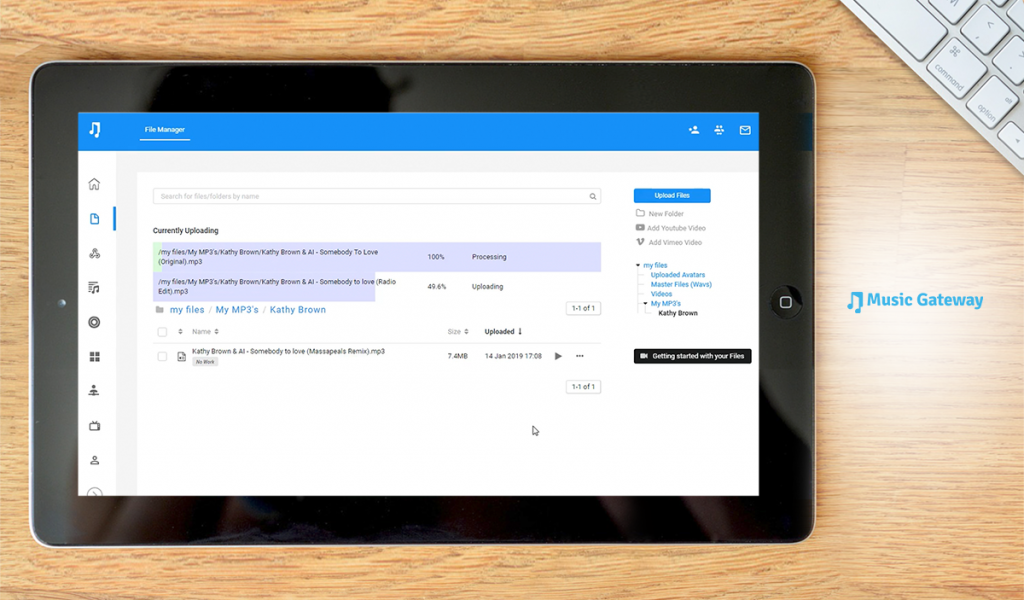With technology making gigantic strides towards revolutionizing the entertainment industry, digital music distribution is hitting a fever pitch. Unfortunately, with the plethora of distributors comes the complexity of choosing the right service for your music. This is because such distributor services offer near-identical features and services within a packaged deal or boutique. There are differences, however, which stem from the scope and magnitude of these services. As such, you have to dissect these distributors to pinpoint one with a suite of services that is perfect for you in terms of budget and target audience.
In this article, we’ve done the heavy lifting for you. We’ve rigorously scrutinized the top music distribution service, unearthing their scope of services, royalties, added services, and features. In this way, after reading this post, it should be easy to pick a distributor that can help your work of art reach as many ears as possible.

What are the best 10 music distribution services?
Despite the COVID-19 pandemic, the US music industry had a good showing in 2020. In the first half of the year, wholesale and retail revenues reached $3.7 billion and $5.7 billion respectively.
It is not only the US music industry that experienced growth. The recording industry in Spain saw an increase of 4% in wholesale revenue. This is just in the first half of the year. In the same period, Germany’s recording industry grew 4.8% on a retail basis.
The growth, as many suggest, is because of streaming.

The Digital Music Segment is showing average growth rates of about 9.9% every year. By the end of 2021, experts predict that global revenue from streaming will reach $23.1 billion. And, music downloads will reach $1.8 billion for a total of $24.8 billion.
Come 2025, the global revenue is projected to reach $34.8 billion.
Many musicians and producers are surely going to ride this wave. However, it can be quite hard to promote music, especially in a saturated market. So, to give your promotions and distributions a boost, you need all the help that you need. This is especially true for those that starting out.
So, without further ado, here are the best cost-effective music distribution services that you can leverage.
1. CD Baby

At the top of the charts, so to speak, is CD Baby, besting competition with its one-two combination of a massive network of over 150 stores and partners and a suite of features, most of which are all under the CD Baby brand.
Artists and musicians pay for every single or album uploaded, and they get a package of features depending on the pricing tier they choose. This setup requires no annual fees, and artists are paid 100% of royalties weekly. CD Baby offers digital distribution, streaming, and physical distribution via CDs and vinyl, as well. Cover song licensing is also offered, and reporting and analytics tools, including income boosting features such as professional publishing administration and social video monetization, are available.
Finally, the company also offers marketing tools all integrated under the CD Baby brand. Pricing starts at $9.95 per single and $49 per album, with a higher pricing tier for more packaged features.
2. Distrokid

Aside from a similarly massive network of partners and stores, Distrokid’s push is being 10 to 20 times faster than any other distributor to get artist music into digital download and streaming platforms. Its biggest difference from CD Baby—aside from the speed claim—is its business model: artists can distribute unlimited songs for an annual fee and get paid 100% of their royalties monthly.
Distrokid also allows artists to set up earning “splits” to route a portion of royalties to others, distribute cover songs legally, and play with backend music sales administration features. The company also offers bespoke value-added services that have separate price tags from their music distribution service. Curiously, Distrokid is the only one in this list highlighting its unlimited data backups.
Like CD Baby, Distrokid distributes to over 150 partners. Pricing starts at $19.99 every year for a single artist, with additional plans for two artists, and five to 100 artists.
3. ReverbNation

As the slogan “Artists First” attempts to impress on musicians, ReverbNation paints itself as more than just a music distributor, but a career-maker for artists. Artists with tight budgets will also be glad to know that the company offers a free tier with direct selling, but digital distribution has separate price tiers.
ReverbNation is the only one in this list that highlights a website-builder for artist branding, as well as fan feedback for music. Indeed, ReverbNation’s suite of features surrounding the basic music distribution panders to the artist’s career: marketing and promotion tools with email and social messaging functions, social media and digital ads, crowdsourced listener reviews, and feedback, and even sponsorship under the ReverbNation brand where artists are introduced and exposed to music industry partners and events. These value-added services come with a separate price tag.
ReverbNation starts at the low price of $0 for direct selling and a basic package of features, but also offers three, larger paid packages with more functionality. For free tier users, they can pay for digital distribution starting at $1 per single or $9 per album per year.
4. LANDR

LANDR is unique in this list because, at its core, it is not a music distribution company. It is an audio mastering software. LANDR offers music production and mastering via a desktop app with digital distribution services.
LANDR takes advantage of AI-powered audio mastering for its software (that also performs audio mastering for video), attempting to give a professional feel and finish to every track produced by its users. Once done with the production process, artists don’t have to go elsewhere for digital music distribution with 100% of earnings and creative control. LANDR also has its own promotional tools and offers free sample packs for inspiration and use. Where ReverbNation offers crowdsourced listener feedback and reviews, LANDR lets producers hear feedback from fellow users.
This music solution offers LANDR Studio, which allows users to create, master and distribute their music. Users can choose from three options: Essentials $8.25/month ($99 billed upfront), Standard $11.99/month ($143.88 billed upfront), and Pro $15.99/month ($191.88 billed upfront).
5. Tunecore

Tunecore is a straightforward distribution service that prides itself on being one of the first in the market, starting the business model in 2006. Artists keep 100% of their royalties for an annual fee.
Aside from music distribution to over 150 digital stores, Tunecore provides its users with comprehensive sales data, and as value-added services: social media promotion and music publishing administration. Essentially, a complete dashboard of backend reporting, marketing, and administration to go with the digital distribution. Note that the value-added services incur a one-time fee.
Artists can distribute via Tunecore starting at $29.99 for their first year and $49.99 each following year for a full album, and $9.99 a year for a single. Tunecore also distributes ringtones for $19.99 a year. Finally, the company also offers distribution credits that can be exchanged for an album, single, and ringtone plans.
6. RouteNote

RouteNote offers free distribution services for 15% of revenues, while also offering artists a premium plan that requires upfront payment but lets them keep 100% of all royalties. RouteNote claims to cover over 90% of the digital distribution market.
Artists and musicians can expect the fundamental digital distribution and direct selling services from RouteNote’s plans, as well as referral rewards, data and reporting on streaming and sales, and inclusion and IDs for Youtube Music Network and Soundcloud. RouteNote also provides free ISRC and UPC codes, as well as a community called RouteNoteStudio that helps members grow audiences faster on Youtube.
Pricing starts at $0, with a 15% cut off any royalties earned as well as two other annual pricing options.
7. OneRPM

OneRPM actively leverages its global network of users for more visibility and opportunities for its members, amplifying the reach of its artists with the help of fan engagement from its existing user base. Also noteworthy is that it offers a free pricing tier, though OneRPM keeps 15% of all royalties—even for paid tiers.
The fundamental offer is music distribution, direct selling, and cover licensing, but extends to marketing, including social media, business intelligence, rights management and publishing, and a Music Video Network that also includes video production.
OneRPM pricing starts with a free tier for audio and a one-time fee for video and ringtone distribution. The company keeps 15% of royalties from audio, 30% for ringtones and Youtube, and 50% for specialty video.
8. Ditto Music

Ditto’s offer is simple: unlimited music distribution to over a hundred digital stores for an annual fee, and artists keep 100% of royalties.
Ditto is the quintessential music distribution service without a lot of fluff. Aside from distribution, the company offers pre-release and promotional tools, streaming and sales data plus reporting, free ISRC and UPC codes, and chart registration.
Pricing starts at $19 a year for one artist, and two higher paid tiers for more artists and packaged features.
9. Fresh Tunes

Established in 2014, Fresh Tunes took the value-add approach. The distribution itself is free of charge, but value-added services are what bring in revenue for the company.
Heavy on Youtube and Facebook, Fresh Tunes’ paid value-added services focus on advertising and audience growth on these two platforms. Aside from marketing and promotion, the company also provides professional consulting for tracks submitted by artists. If accepted, these tracks are branded for promotion, and the artists receive feedback on their work.
Because of its business model, Fresh Tunes’ pricing starts at $25 for promotion, but the total price tag depends on how much the user wants to spend—it functions as a modern advertising program such as pay-per-click ads. Meanwhile, the price tag for professional consulting depends on how many tracks are submitted for consideration.
10. Music Gateway

Music Gateway delivers impact from the get-go. Although distribution is among its newer services, the platform was quickly distinguished by Spotify as a preferred partner and has gained recognition in this area. It empowers creators to distribute, publish, license, master, and promote their outputs in one location, with access to Spotify, Apple Music, and more than 150 digital service providers globally.
Music Gateway’s free account allows users to distribute up to five tracks at no cost, serving as a means for creators to test the service before upgrading their accounts to a premium membership. Its Pro subscription enables users to distribute 80 tracks while its Unlimited subscription offers unlimited distribution with a host of special features.
Hailed for its 360-degree approach to music services, Music Gateway also provides reliable promotion services, as the app connects users to a plethora of widely used platforms, including YouTube, Spotify, and TikTok (influencer promotion). The prices of the paid plans are $22/month for the Pro plan and $37/month for the Unlimited plan.
How does customer support differ among music distribution services?
When choosing a music distribution service, reliable and accessible customer support can be crucial for addressing any issues quickly, ensuring smooth releases, and managing royalties. Distribution services vary widely in the level of support they offer, and knowing these differences can help artists select a platform that aligns with their needs.
- 24/7 Support Availability: Some distributors, like CD Baby, offer comprehensive support with multiple contact options, including 24/7 support via email or chat. This around-the-clock service can be invaluable for artists needing assistance with time-sensitive issues.
- Dedicated Account Managers: Premium services such as TuneCore’s top-tier plans provide dedicated account managers for personalized guidance and support, ideal for artists who prioritize direct communication and tailored assistance.
- Community-Based Support: Platforms like ReverbNation offer community-based support options, where users can access forums, guides, and user-driven discussions to find solutions. This approach fosters a community-driven environment but may lack direct response from official representatives.
- Self-Service Resources: Services like Distrokid focus heavily on self-service resources, providing comprehensive FAQs, help articles, and video tutorials to guide users through common issues without needing direct support.
Understanding the type of customer support offered by each distributor can help artists anticipate how well the service will align with their need for responsiveness and assistance during the distribution process.
Which Music Distribution Service Should You Choose?
While CD Baby may be the top contender on this list, it does not automatically dominate the market due to practical considerations. Artists looking to break specifically into the Chinese market, for instance, will do no better with Musicinfo. Meanwhile, producers who need mastering software and distribution services tend to lean towards LANDR. Musicians who want to start to reach more and more audiences with as little monetary investment as possible may choose some of the free options, such as Fresh Tunes.
All of these companies offer the same services at their core: direct sales and digital distribution of music. Often, cover licensing is included, and usually, they offer within their paid packages administration, reporting, and marketing to varying degrees. Artists and musicians should, therefore, attribute more significance either to unique offerings or value-added services and how well these contribute to their goals, aside from other considerations like budget constraints.
There is no doubt, using the best music distribution service will lift your music career to heights you never thought possible. As you scale the heights in this industry and establish your footprints all over the globe, new opportunities will emerge. For example, once you garner a commendable social following, brands will come after you persuading you to be their brand ambassador or influencer. Be sure to check our compilation of marketing statistics to learn more about the trends, data, and stats in influencer marketing. This way, you’ll have the insights to make a decisive move when such opportunities show up.
Key Insights
- Diverse Pricing Models: Music distribution services offer various pricing models, including one-time fees, annual subscriptions, and free tiers with a percentage cut from royalties.
- Value-Added Services: Many distributors provide additional services such as marketing, cover song licensing, analytics, social media promotion, and audio mastering.
- Global Reach: Most top distributors have partnerships with over 100 digital stores and streaming platforms, ensuring wide reach and accessibility for artists.
- Targeted Features: Some distributors, like ReverbNation, offer unique features such as website builders and fan feedback, tailored to enhance an artist’s career.
- Speed and Efficiency: Distributors like Distrokid emphasize faster turnaround times for getting music onto platforms, which can be crucial for timely releases.
- Royalty Management: Services vary in how they handle royalties, with some offering 100% of earnings to artists while others take a percentage cut.
- Technological Integration: Many distributors are integrating emerging technologies like AI-powered audio mastering (LANDR) and advanced analytics to provide better service.
- Market Adaptation: Distributors are adapting to regional markets, such as Musicinfo’s focus on breaking into the Chinese market.
- Flexibility and Customization: Services like Airbase offer customizable features and plans, catering to different needs and budgets of artists.
- Promotion and Engagement: Platforms like Music Gateway provide extensive promotional tools, helping artists connect with wider audiences through platforms like YouTube, Spotify, and TikTok.
FAQ
- What is the best music distribution service for new artists? CD Baby and Distrokid are popular choices for new artists due to their extensive reach and affordable pricing models.
- Can I distribute my music for free? Yes, services like Fresh Tunes and RouteNote offer free distribution options, though they may take a percentage of your royalties.
- How do music distribution services handle royalties? It varies by service. Some, like Distrokid, offer 100% of royalties to artists for a fee, while others take a percentage cut from the earnings.
- Do these services offer marketing and promotion? Yes, many services provide marketing tools, social media promotion, and even fan feedback options to help artists grow their audience.
- How quickly can I get my music on streaming platforms? Distrokid claims to be 10 to 20 times faster than other distributors, often getting music onto platforms within days.
- Can I distribute cover songs legally? Yes, many distributors like CD Baby and Distrokid offer cover song licensing as part of their services.
- What if I need mastering services for my tracks? LANDR offers AI-powered audio mastering alongside distribution, making it a great choice for artists needing both services.
- Which service is best for reaching a global audience? Most top distributors, including CD Baby, Distrokid, and TuneCore, have partnerships with over 100 global digital stores and streaming platforms.
- Are there any services tailored for specific markets? Yes, for example, Musicinfo is focused on helping artists break into the Chinese market.
- Do these services offer analytics and reporting? Yes, many distributors provide detailed sales and streaming analytics to help artists track their performance and make informed decisions.























I had to move away from Tunecore, because they didn't answer me when I had a problem uploading and publishing a new album. I run a recordlabel that puts out several albums each year, so this was of course a really big issue for my label. I had to make som quick decisions and ended up using Ditto. Also, Tunecore did not warn me that one of my albums was about to expire. This had happened before, but there were no problem getting it up again at that time. This time I just couldn't due to the problems I was having uploading and publishing. So i ended up moving this to. And for the record, it had not gone 12 months since that album was first uploaded, so I was kinda shocked they took it down.
I've never had any payment-issues with Tunecore, nor any problem with their reports. Those are actually very good. But the have no customer-service and ignores those who doesn't make it big. My advice is to stay away for TuneCore, because once you hit a problem, then all anyone can do is to wish you good luck.
None of the above companies has e-mail-based customer support operated by real humans and directly communicating with their artists.. This shows lack of responsibility and therefore, lack of professionalism, which leads to having no trust in them.
As a basic principle and business model why are there no companies simply offering a straight percentage cut from sales? Surely if a distribution companies efforts to work on behalf of artists is increased when they have a financial incentive invested in the project? Never mind all the candy wrapping ad on expenses ... just a straight and fair split would see them firstly showing that they believe in the product and secondly going out there to actually work it and get a return
I agree with you 100%. They should be vested if they believe in the project
Which distributors in this list are flexible with track names and artist names? (i.e. strange punctuation and capitalisation) I want to be creative and free with this, but I know Distrokid restrict it enormously, please help :)
Unfortunately CD Baby whom I have been with for over 10 years is now refusing to answer customers complaints, they havent paid thousands of musicians from what the forums are saying, I personally have been owed money for over two year with no paypout, to have them at the top of this list shows you did not do your homework.
i have had a very bad experience with CD baby , they do not answer their clients musicians concerns . i personally have been struggling to get my complaints heard , but they do not give satisfying results to that . it's really a pity because as an independent music producer i counted a lot on them , as i've heard in the past years around 2010 many good thoughts .but things have changed tremendously since Derek Sivers the initial owner has sold the company later . 2017 was my APACIONADO-Adel Jouini album which i produced with all the love that a musician can give and submitting the final mastered product to their site , it began so well , had a lot of people who knew me purchasing the album , but i don't know what happened then,they disrespectufully placed a gnome on my main profile picture inside .i remember i paid for their service , i sent them a receipt of that payment maybe more than 5 times,but got nothing in return , they didn't pay me my royalities and i know they distributed my album on all platforms like Spotify ,i tunes , Amazon etc...
what could a musician expect from a dstribution like this , nothing .
I kicked CD Baby right in the trash can years ago. My songs were being downloaded from all over but every 4 to 6 months I would get a check for only $25.00 or $30.00 dollars. Somebody was getting paid...but it wasn't me. I have a radio show now with a following, I sell digital downloads on my own, and I keep at least 90% of the profits.
These digital companies reel people in with the promise of distributing our music to all the major digital streaming sites, which works well for a well-known artist with millions of fans already, but for an unknown artist, writer, and producer, it really is a waste of our time and money. Tune Port started off well, but now they have an issue where NOBODY, can get on their page to do any business, load, or check for possible sales. Man, I'm done with all of these companies. Better off on my own!
Leave a comment!